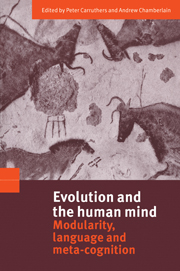Book contents
- Frontmatter
- Contents
- List of contributors
- Preface
- 1 Introduction
- 2 Massively modular minds: evolutionary psychology and cognitive architecture
- 3 Individual differences in early understanding of mind: genes, non-shared environment and modularity
- 4 Darwin in the madhouse: evolutionary psychology and the classification of mental disorders
- 5 Evolution of the modern mind and the origins of culture: religious concepts as a limiting-case
- 6 Symmetry and the evolution of the modular linguistic mind
- 7 Evolution, communication and the proper function of language
- 8 The evolution of knowledge
- 9 Mind, brain and material culture: an archaeological perspective
- 10 The evolution of strategic thinking
- 11 On the origin of the human mind
- 12 The evolution of consciousness
- 13 Evolution, consciousness and the internality of the mind
- References
- Author index
- Subject index
6 - Symmetry and the evolution of the modular linguistic mind
Published online by Cambridge University Press: 18 December 2009
- Frontmatter
- Contents
- List of contributors
- Preface
- 1 Introduction
- 2 Massively modular minds: evolutionary psychology and cognitive architecture
- 3 Individual differences in early understanding of mind: genes, non-shared environment and modularity
- 4 Darwin in the madhouse: evolutionary psychology and the classification of mental disorders
- 5 Evolution of the modern mind and the origins of culture: religious concepts as a limiting-case
- 6 Symmetry and the evolution of the modular linguistic mind
- 7 Evolution, communication and the proper function of language
- 8 The evolution of knowledge
- 9 Mind, brain and material culture: an archaeological perspective
- 10 The evolution of strategic thinking
- 11 On the origin of the human mind
- 12 The evolution of consciousness
- 13 Evolution, consciousness and the internality of the mind
- References
- Author index
- Subject index
Summary
The archaeological record of hominid-imposed symmetry provides a direct look at evolutionary developments in the hominid mind. Well before the appearance of anatomically modern humans, and perhaps prior even to the appearance of Homo sapiens, hominid spatial cognition had become essentially modern. This development required the evolution of the hominid visual input module (in the sense of Fodor, 1983), but also developments in central processing. It did not, however, require language.
The archaeology of mind
The products of minds can provide clues to the organisation and working of the minds themselves. Most commonly, the products of minds are actions of some kind, and because action is ephemeral, it is necessary to observe or record it if we want to make inferences about the mind itself. This places obvious limits on our ability to make inferences about the minds of individuals who lived long ago; we cannot observe their actions. Some actions do affect material things, which as a consequence ‘record’ some features of the original action. Archaeology consists of a set of methods for reconstructing past action from patterns of material things that exist in the present. If the reconstructions of past action are reliable, they should allow inferences about the minds behind the action.
There are some obvious methodological caveats to an archaeology of cognition. The first is the problem of resolution.
- Type
- Chapter
- Information
- Evolution and the Human MindModularity, Language and Meta-Cognition, pp. 113 - 139Publisher: Cambridge University PressPrint publication year: 2000
- 21
- Cited by



